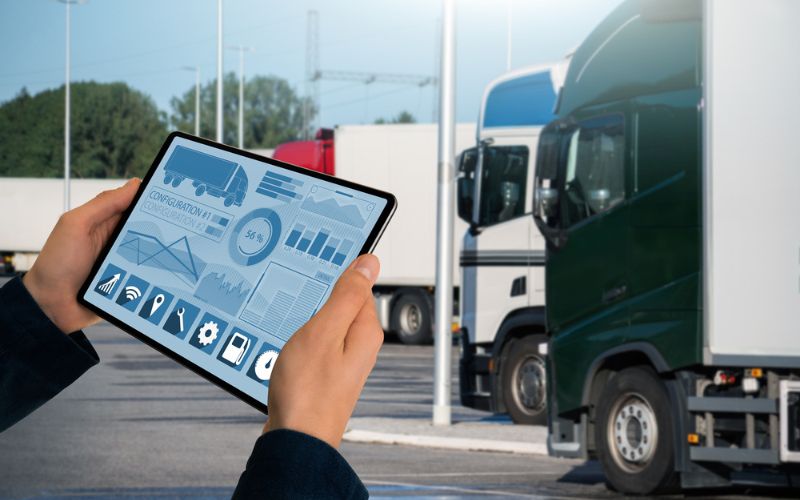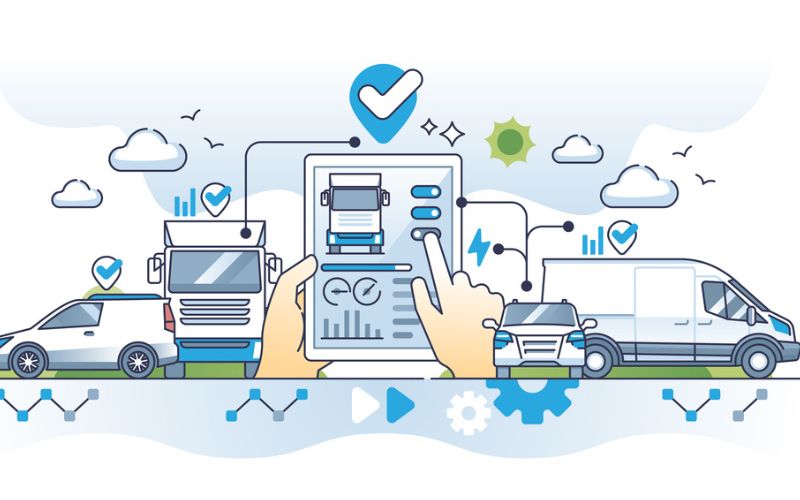
In recent years, telematics has become increasingly important for fleet managers, with most top companies implementing telematics systems for fleet management. It is taking a larger role than ever, integrated into more business systems and processes, and being used more effectively to increase productivity and efficiency. Join us in exploring the role of telematics in fleet optimization.
Telematics allows vehicles and assets to be tracked and monitored through Global Positioning System (GPS) technology, diagnostics technologies, and other integrated systems to facilitate fleet operations. It is most commonly known for GPS vehicle tracking, but telematics systems can offer more functionality and benefits, such as dash cams for video telematics, and a wide range of fleet data that can be gathered. An effective telematics system is now essential for fleets of any type.

Telematics data points can be collected from a variety of sources. Location tracking data, speed, engine performance and diagnostics data, and more, mean a wide range of real time data can be used to improve fleet efficiency and productivity. Data is collected via different sensors, GPS fleet tracking technology, and vehicle diagnostics codes to track engine and other vehicle health information. The data even enables tracking of driver behavior, traffic data, and much more.
With improved technology and more ability to integrate telematics systems with assets and other, third party systems, the wealth and robustness of telematics data is increasing, and allows fleet managers to gather more actionable information.
Fleet telematics technology is becoming an essential tool for fleet managers, and an integral part of any fleet management system. Traditionally, it was very difficult for fleet managers to have concrete and reliable information to act on, but with fleet telematics, their roles are much better supported. It allows for better-informed decision making, with accurate and robust data collections. Real-time information allows for timely and effective responses.
It also eliminates a great deal of time-consuming administration that traditionally was involved in tracking compliance measures, scheduling and route optimization and planning, and other tasks.
With driver performance tracking, fleet managers are able for the first time to really be on top of what fleet operators are doing and what their driving practices are, regardless of where on the road they are.
With vehicles and drivers tracked fully, and driver behavior reporting provided in real time, safety can be better managed. Systems can allow for notifications to alert drivers on risky driving behaviours, to remind them to drive more safely, for immediate correction. Collision notifications allow fleet managers to respond instantly to help the driver.
Investigations are more productive with accident reconstruction, to implement corrective actions into the fleet safety program.
Stolen vehicles are quickly and easily recovered with vehicle location and vehicle activity tracking, and unauthorized vehicle use is quickly stopped. Automatic alerts to notify management keeps the company on top of any issues. This prevents damages, incidents involving company and third party people and property, as well as vehicle loss.

With fleet telematics devices, odometer readings are automatically tracked for the entire fleet by a fleet management software, to help schedule preventive maintenance.
Even more beneficial for preventive maintenance efforts, diagnostic trouble codes with vehicle engine diagnostics are automatically tracked and sent to management for attention. Small issues are caught early, before they can deteriorate and result in longer vehicle downtime. Vehicles are flagged automatically as needing work, and the provided diagnostic information reduces downtime at the mechanic. By integrating with original equipment manufacturers, fleet operators gain real-time data and prognostics.
With the diagnostic abilities of the trouble codes, it also helps with predictive vehicle maintenance to address issues before they happen.
Each vehicle's performance and fuel efficiency can be improved while lowering maintenance costs.
All companies are now expected to take greater measures to reduce their environmental impact. By improving fleet efficiency through fleet and route optimization and lowered fuel consumption through better fleet maintenance, vehicle fleet fuel efficiency is improved to lower a company's footprint. The operational data can also be used to facilitate a move to electric vehicles.
Asset tracking to reduce fuel usage and fuel costs from idling and other poor driving behaviours further reduce wastefulness.
A key area where telematics is now playing an essential role in all fleets' operations is for compliance efforts, including Hours of Service and other requirements. While modern telematics systems simplify companies' efforts greatly for compliance, managing all the reporting and other details, with new ELD legislation, it is now also mandatory for companies to implement a telematics device system for logging.
Telematics plays a key role in improving operations and procedures. From simplifying procedures, reducing administration, and enabling more informed decisions with better vehicle data, it can help with reducing operating costs, optimizing operations, and enhancing productivity.
The role of telematics is still growing in scope, and the future of telematics is expanding. It now includes niche areas like insurance telematics, which tracks information for insurance purposes, with an opportunity for companies with good driving records to get lower insurance.
Intelligence data and performance benchmarking are other areas that are starting to play more critical roles for fleets, now that the data required for such activities are now more easily available.
Smart cities are also using telematics to develop urban analytics; some of this data can also be used for, and is beneficial to, commercial fleets.
Finally, more and more industries with non-traditional fleets are now able to benefit from a fleet telematics system, including golf courses, fishing and ships, and much more.

The benefits of telematics devices and fleet management software solutions mean that telematics have become essential for those in the transportation industry and other fleet companies to stay competitive. It plays a role in so many aspects of fleet management, and can integrate so well into all of them as well as other business operations and systems, that management can expect its role to continue expanding.
At Connected Vehicles, we help organizations implement robust telematics systems that effectively handle all of these roles, and are flexible enough to grow in the future.



